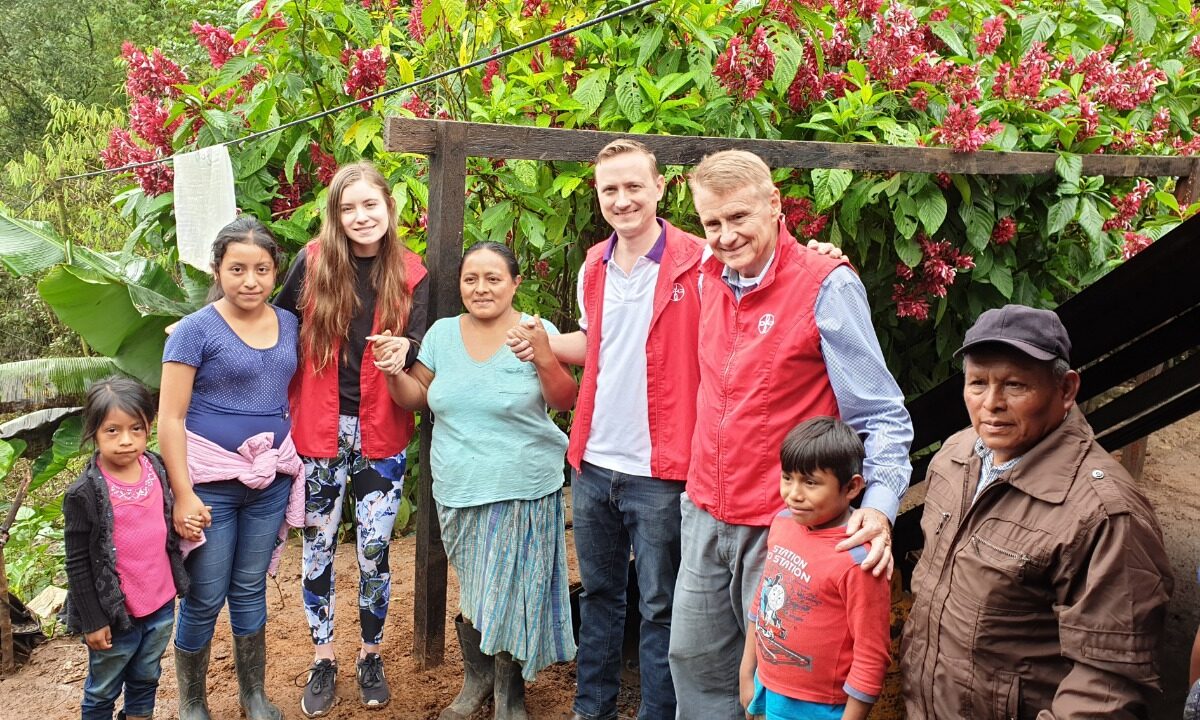Jamie Waller ’75: Education and opportunity

Wall Street veteran uplifts the lives of Guatemalan children.
In 1973, English Instructor Peter Greer brought his Outdoor Challenge physical education class to a rock ledge, explained how to rappel, then asked for a volunteer to go first. Jamie Waller’s hand went up immediately. “I was always a risk taker,” Waller ’75 says. “I always had to climb to the top of the tree.”
Waller points to that Exeter course focusing on limit-testing activities including orienteering and solo hiking as the genesis of his lifelong can-do attitude. That energy fueled his successful 25-year career as a fintech executive and second calling to devote his time and resources to helping others. In 2008, Waller, a father of two adult children, founded Cadaniño, a nonprofit that offers aid to special needs orphans in Guatemala City — a decision he made only a year after he had first set foot in the country. He has called Guatemala home ever since.
Over time, Cadaniño has broadened its scope. The free after-school program now serves 250 children ages 7 to 18 at two community centers that offer academic tutoring in STEM subjects, access to computers and a lending library — a rarity in the sprawling city of 7 million. It employs neighborhood teachers who are given access to financial support for continuing education.
“We want to increase a thirst and a desire to learn,” Waller says. Most participants visit three times a week and are welcome to continue so long as they stay in school. “We don’t have a Harkness table, but we do align with concepts of self-development and self-motivation in the sense that the kids decide when and how they advance. They learn to type and use a mouse, and then Word, PowerPoint and Excel. There are kids who even start programming in Python and C++.”
Cadaniño’s efforts have positively affected post-middle school dropout and low literacy rates. Many participants have graduated from high school and some have gone on to college. Others have found employment with a local tech company. Although the organization is ministry-based, it has no religious requirements. Waller says the “nones” are the biggest group in terms of religion, but everyone is offered Bible classes, and older participants can take part in a local mission program, bringing food to shut-ins.
During COVID, Cadaniño sent home not only weekly assignments, but also food. Ensuring that program participants have at least one meal a day is a tradition that has endured. It’s part of a holistic approach to help children gain a “sense of opportunity,” Waller says.
Waller followed his brother, William ’73, to Exeter, where he played water polo, dabbled in theater and spent a semester in Barcelona improving his Spanish skills. After taking time off, he landed at Syracuse University, where he was an English major and fiction editor of the Syracuse Review.
Rejected by the Iowa Writers’ Workshop, despite letters of recommendation from fellow writers Tobias Wolff and Raymond Carver, Waller headed to New York City after graduation. There he reconnected with classmate and friend Jay Whipple III ’75, founder of Security APL. Early Internet pioneers, they were the first to facilitate a trade over the public internet. In 1996, they sold the company to CheckFree, where Waller stayed until 2001.
It’s an easy date for him to remember: His office was on the 42nd floor of 7 World Trade Center, which collapsed after the twin towers fell on 9/11. Though he was at Citibank at the time, he later returned to CheckFree to run three turn-around companies. When the 2008 recession hit, he was ready to start over.
Waller says that his business background keeps Cadaniño a “tight ship financially,” with accountability and transparency always top of mind. The future includes developing ideas to share the curriculum and best practices with other community centers, a concept Waller calls “Cadaniño in a box.” But for Waller, who personally gifts new laptops to the top two students in the program each year, relationships are most important. “You want to work with each kid and treat them as an individ-ual,” he says, “and eventually you want to reach all children.”
This article was originally published in the Winter 2025 issue of The Exeter Bulletin.